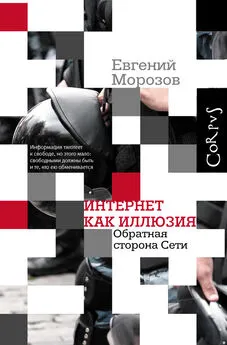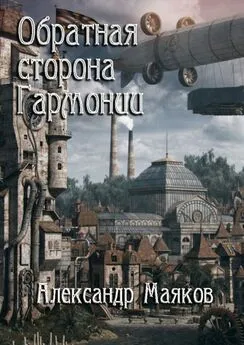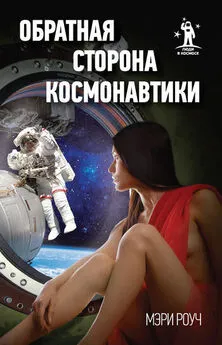Евгений Морозов - Интернет как иллюзия. Обратная сторона сети
- Название:Интернет как иллюзия. Обратная сторона сети
- Автор:
- Жанр:
- Издательство:Array Литагент «Corpus»
- Год:2014
- Город:Москва
- ISBN:978-5-17-084792-1
- Рейтинг:
- Избранное:Добавить в избранное
-
Отзывы:
-
Ваша оценка:
Евгений Морозов - Интернет как иллюзия. Обратная сторона сети краткое содержание
Интернет как иллюзия. Обратная сторона сети - читать онлайн бесплатно полную версию (весь текст целиком)
Интервал:
Закладка:
MacKenzie, D. Knowing Machines: Essays on Technical Change . Cambridge, MA: MIT Press, 1998.
Mander, J. Four Arguments for the Elimination of Television . Goa, India: Other India Press, 1998.
Mander, J. In the Absence of the Sacred: The Failure of Technology and the Survival of the Indian Nations . San Francisco: Sierra Club Books, 1991.
Manjoo, F. The Co-Founders of Twitter Say It Will Change the World. They Should Remind People That It’s Also Fun // Slate, April 15, 2010.
Marx, L. The Pilot and the Passenger: Essays on Literature, Technology, and Culture in the United States . New York: Oxford University Press, 1988.
Marx, L. Technology: The Emergence of a Hazardous Concept // Social Research 64, no. 3 (1997): 965–988.
McFarland, F. B. Clarence Ayres and His Gospel of Technology // History of Political Economy 18, no. 4 (1986): 617.
McLoughlin, I., Badham, R., and P. Couchman Rethinking Political Process in Technological Change: Socio-Technical Configu-rations and Frames // Technology Analysis & Strategic Management 12, no. 1 (2000): 17–37.
Melzer, A. M., Weinberger, J., and M. R. Zinman Techno-logy in the Western Political Tradition . Ithaca, NY: Cornell Univer-sity Press, 1993.
Merrin, W. Media Studies 2.0 : Upgrading and Open-Sourcing the Dis-cipline // Interactions: Studies in Communication and Culture 1 (2009): 17–34.
Michael, D. N. Too Much of a Good Thing? Dilemmas of an Infor-mation Society // Technological Forecasting and Social Change 25, no. 4 (1984): 347–354.
Mickelson, Sig From Whistle Stop to Sound Bite: Four Decades of Politics and Television . New York: Praeger, 1989.
Misa, T. J. How Machines Make History, and How Historians (and Others) Help Them to Do So // Science, Technology, and Human Values (1988): 308–331.
Misa, T. J. Leonardo to the Internet: Technology and Culture from the Renaissance to the Present . Baltimore: Johns Hopkins University Press, 2004.
Misa, T. J. Theories of Technological Change: Parameters and Purposes // Science, Technology, and Human Values 17, no. 1 (1992): 3–12. Misa, T. J., Brey, Philip, and Andrew Feenberg Modernity and Technology . Cambridge, MA: MIT Press, 2004.
Mosco, V. From Here to Banality: Myths About New Media and Com-munication Policy // Seeking Convergence in Policy and Practice (2004): 23.
Mosco, V. Review Essay: Approaching Digital Democracy // New Me-dia & Society (2009).
Mosco, V., and D. Foster Cyberspace and the End of Politics //
Journal of Communication Inquiry 25, no. 3 (2001): 218. Mowshowitz, A. Computers and the Myth of Neutrality / In: Pro-ceedings of the ACM 12th Annual Computer Science Conference on SIGCSE Symposium, 92. 1984.
Munir, K. A., and M. Jones Discontinuity and After: The Social Dynamics of Technology Evolution and Dominance // Organization Studies 25, no. 4 (2004): 561.
Nerone, J. The Future of Communication History // Critical Studies in Media Communication 23, no. 3 (2006): 254–262.
Neuman, J. The Media’s Impact on International Affairs, Then and Now // SAIS Review 16 (1996): 109–124.
Nguyen, A. The Interaction Between Technologies and Society: Lessons Learned from 160 Evolutionary Years of Online News Services // First Monday 12, no. 3–5 (2007).
Nissenbaum, H. How Computer Systems Embody Values // Com-puter 34, no. 3 (2001): 120.
Noble, D. F. America by Design: Science, Technology, and the Rise of Corporate Capitalism . New York: Oxford University Press, 1979.
Noble, D. F. Forces of Production: A Social History of Industrial Automation . New York: Oxford University Press, 1986.
Nye, D. E. American Technological Sublime . Cambridge: MIT Press, 1996.
Olsen, J. – K. B., and E. Selinger Philosophy of Technology:
Five Questions . Copenhagen: Automatic Press/VIP, 2007. Olsen, J. – K. B., Selinger, E., and S. Riis New Waves in
Philosophy of Technology . New York: Palgrave Macmillan, 2009. Ornatowski, C. M. Techne and Politeia: Langdon Winner’s
Political Theory of Technology and Its Implications for Technical Communication // Technical Communication Quarterly 11, no. 2 (2002): 230–234.
PÄrna, K. Believing in the Net: Implicit Religion and the Internet
Hype, 1994–2001. PhD diss., Leiden University, 2010. Patnode, R. Path Not Taken: Wired Wireless and Broadcasting in the 1920 s // Journal of Broadcasting & Electronic Media 49, no. 4 (2005): 383–401.
Pease, E. C., and E. E. Dennis, eds. Radio: The Forgotten
Medium . New Brunswick, NJ: Transaction Publishers, 1995. Pfaffenberger, B. Fetishised Objects and Humanised Nature: Towards an Anthropology of Technology // Man 23, no. 2 (1988): 236–252.
Pfaffenberger, B. Social Anthropology of Technology // Annual Review of Anthropology 21, no. 1 (1992): 491–516.
Pfaffenberger, B. The Social Meaning of the Personal Computer; or, Why the Personal Computer Revolution Was No Revolution // Anthropological Quarterly (1988): 39–47.
Pfaffenberger, B. Symbols Do Not Create Meaning – Activities Do; or, Why Symbolic Anthropology Needs the Anthropology of Techno-logy // Anthropological Perspectives on Technology (2001): 77–86.
Pfaffenberger, B. Technological Dramas // Science, Technology & Human Values 17, no. 3 (1992): 282.
Post, Robert C. Missionary: An Interview with Melvin Kranzberg
// American Heritage of Invention & Technology 4, no. 3 (1989). Post, Robert C. No Mere Technicalities: How Things Work and Why
It Matters // Technology and Culture 40, no. 3 (1999): 607–622. Postman, Neil Informing Ourselves to Death . Speech at the German
Informatics Society, October 11, 1990.
Pursell, C. W., Jr. Government and Technology in the Great Depression // Technology and Culture 20, no. 1 (1979): 162–174.
Radder, H. Normative Reflexions on Constructivist Approaches to Science and Technology // Social Studies of Science 22, no. 1 (1992): 141–173.
RÜrup, R. Historians and Modern Technology: Reflections on the Development and Current Problems of the History of Technology // Technology and Culture (1974): 161–193.
Scannell, P. The Dialectic of Time and Television // Annals of the American Academy of Political and Social Science 625, no. 1 (2009): 219.
Schaniel, W. C. New Technology and Culture Change in Traditional
Societies // Journal of Economic Issues 22, no. 2 (1988): 493–498. Segal, H. P. Technological Utopianism in American Culture . Syracuse,
NY: Syracuse University Press, 2005.
Shen, X. The Chinese Road to High Technology: A Study of Telecommunications Switching Technology in the Economic Transition . New York: St. Martin’s, 1999.
Sibley, M. Q. Utopian Thought and Technology // American Journal of Political Science (1973): 255–281.
Smith, M. R., and L. Marx, eds. Does Technology Drive History? The Dilemma of Technological Determinism . Cambridge, MA: MIT Press, 1994.
Sola Pool, Ithiel de Technologies of Freedom . Cambridge, MA: Harvard University Press, 1983.
Spar, D. L. Ruling the Waves: Cycles of Discovery, Chaos, and Wealth from Compass to the Internet . New York: Harcourt, 2001.
Standage, T. The Victorian Internet: The Remarkable Story of the Telegraph and the Nineteenth Century’s On-Line Pioneers . New York: Walker, 1998.
Staudenmaier, J. M. Rationality, Agency, Contingency: Recent Trends in the History of Technology // Reviews in American History (2002): 168–181.
Staudenmaier, J. M. Technology’s Storytellers: Reweaving the Human Fabric . Cambridge, MA: Society for the History of Technology and the MIT Press, 1989.
Stump, D. J. Socially Constructed Technology // Inquiry 43, no. 2 (2000): 217–224.
Sturken, M., and D. Thomas Technological Visions: The Hopes and Fears That Shape New Technologies . Philadelphia: Temple Uni-versity Press, 2004.
Tedre, M., Sutinen, E., Konen, E., and P. Kommers Eth-nocomputing: ICT in Cultural and Social Context // Communications of the ACM49, no. 1 (2006): 130.
Teich, A. H., ed. Technology and the Future . 9th ed. Belmont, CA: Wadsworth/Thomson, 2003.
Thorne, K., and A. Kouzmin Cyberpunk-Web 1.0 ‘Egoism’ Greets Group-Web 2.0 “Narcissism”: Convergence, Consumption, and Sur-veillance in the Digital Divide // Administrative Theory & Praxis 30, no. 3 (2008): 299–323.
Thrift, N. New Urban Eras and Old Technological Fears: Reconfiguring the Goodwill of Electronic Things // Urban Studies 33, no. 8 (1996): 1463.
Van Dijck, J., and D. Nieborg Wikinomics and Its Discontents: A Critical Analysis of Web 2.0 Business Manifestos // New Media & Society 11, no. 5 (2009): 855.
Verheul, J., ed. Dreams of Paradise, Visions of Apocalypse: Utopia and Dystopia in American Culture . Amsterdam: VU University Press, 2004.
Warf, B., and J. Grimes Counterhegemonic Discourses and the In-ternet // Geographical Review 87, no. 2 (1997): 259–274.
Weightman, G. Signor Marconi’s Magic Box: The Most Remarkable Invention of the 19 th Century and the Amateur Inventor Whose Genius Sparked a Revolution . Cambridge, MA: Da Capo Press, 2003.
Wellman, B., and B. Hogan The Immanent Internet // Netting
Citizens: Exploring Citizenship in a Digital Age (2004): 54–80. White, D. M., ed. Popular Culture . New York: New York Times,
1975.
Williams, R., and E. Williams Television: Technology and Cul-tural Form . New York: Routledge, 2003.
Winner, L. Autonomous Technology: Technics-Out-of-Control as a Theme in Political Thought . Cambridge, MA: MIT Press, 1978. Winner, L. Social Constructivism: Opening the Black Box and Finding It Empty // Science as Culture 3, no. 3 (1993): 427–452.
Winner, L. The Whale and the Reactor: A Search for Limits in an Age of High Technology . Chicago: University of Chicago Press, 1988.
Winseck, D. R., and R. M. Pike Communication and Empire: Media, Markets, and Globalization, 1860–1930. Durham, NC: Duke University Press, 2007.
Wise, G. Technological Prediction, 1890–1940. PhD diss., Boston Uni-versity, 1976.
Woolgar, S., and G. Cooper Do Artefacts Have Ambivalence? Moses’ Bridges, Winner’s Bridges and Other Urban Legends in S&TS // Social Studies of Science 29, no. 3 (1999): 433.
Wyatt, S. Technological Determinism Is Dead; Long Live Technological Determinism / In: Hackett, E. J., et al., eds. The Handbook of Science and Technology Studies , 165. Cambridge, MA: MIT Press, 2008.
Глава 11. Дело техникиArendt, H. On Violence . New York: Harcourt, Brace, Jovanovich, 1970.
Austin, E. K., and J. C. Callen Reexamining the Role of Digital
Technology in Public Administration: From Devastation to Disclo-sure // Administrative Theory & Praxis 30, no. 3 (2008): 324–341.
Bostrom, N. Technological Revolutions: Ethics and Policy in the Dark //
Nanotechnology and Society (2007).
Brown, M. B. Can Technologies Represent Their Publics? // Techno-logy in Society 29, no. 3 (2007): 327–338.
Читать дальшеИнтервал:
Закладка:










